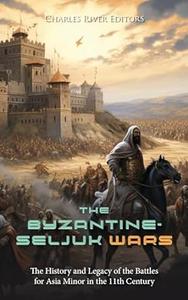
Free Download The Byzantine-Seljuk Wars: The History and Legacy of the Battles for Asia Minor in the 11th Century
by Charles River Editors
English | 2023 | ASIN: B0CQW3LPBP | 123 Pages | ePUB | 6 MB
The Byzantine Empire existed for over a thousand years, with a history spanning from the division of the Roman Empire in 395 until the Ottoman conquest of Constantinople in 1453. It was formed from the previous Eastern Roman Empire, and during its long existence, the Byzantine inhabitants were very proud to call themselves Romans.
However, many things changed during the long lifespan of the Byzantine Empire, starting with a Hellenization in the 6th century. The use of the Latin language diminished and Greek took its place, while the typical Roman culture gave way to a more Hellenistic one. The Hellenization of Byzantium was detrimental to the relationship with the Holy Roman Empire, and the Christian world from that point would be split in two. The subsequent strengthening of the Orthodox Church caused many civil wars and conflicts to arise during the centuries, which shattered and reshaped the territory time after time. By the end of the Byzantine Empire's existence, the old age had weakened both the state and church, making it an easy target for invading forces.
The most notable invaders were the the Turkish-speaking Seljuks, led through a series of battles by Kutalmishouglu Suleiman, who supported different usurpers against the Byzantine emperor. The expansion of the Seljuks was so successful that when Suleiman died, he had put all of Bithynia under his control as well as several important harbor towns along the shores on the Asian side of Bosphorus. With that accomplishment, he had managed to separate the Byzantines living in Anatolia from their emperor in Constantinople. This immediately weakened the unity of the Byzantine Empire.
When another invading Muslim army took control of what is now Syria, Israel, and Northern Africa, the dismembered Byzantine Empire lost significant portions of land, but that allowed it to grow into a smaller and stronger unity. It took a lot of power struggles and battles on many fronts for the empire to recapture some of the lands, but gradually the Byzantine Empire lost all influence in Anatolia. By the end of the 11th century, the Hellenic culture and Greek language were replaced by Islam and Turkish.
Of all the conflicts that brought this state of affairs into being, few were as instrumental as the Battle of Kapetron, the culmination of one of the first major Seljuk raids into Byzantine territory. It represented not just a clash of ethnicities, cultures, and religions, but also a harbinger of a changing of the guard, and one that would shape geopolitics in the region for the next several centuries.
A generation later, the two sides fought the instrumental Battle of Manzikert, a Seljuk victory that was recently mentioned by Turkey's current leader. In the Republic of Turkey, Victory Day is an important commemoration that remembers the Battle of Dumlupinar (August 26-30, 1922), when a Greek invasion of western Anatolia was effectively halted. Mustafa Kemal Pasha, the founder of modern Turkey, rescued Anatolia (Asia Minor) from an attempt by Greece to conquer the Greek-speaking regions. This nationalistic conflict severed Turkey from its imperial Ottoman past and set it on a path as a free, independent, and secular nation.
